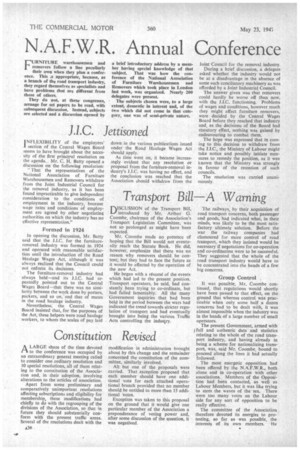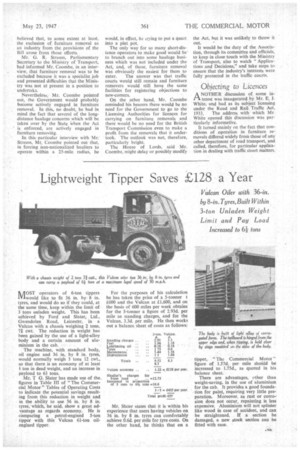Transport Bill—A Warning D ISCUSSION of the Transport Bill, introduced by
Page 46

Page 49

If you've noticed an error in this article please click here to report it so we can fix it.
Mr. Arthur G. Coombe, chairman of the Association's Transport Legislation Committee, was not so prolonged as might have been expected.
Mr. Coombe made no pretence of hoping that the Bill would not eventually reach the Statute Book. He did, however, emphasize that there was no reason why removers should be content; but they had to face the future as it would be affected by the operation of the new Act.
He began with a résumé of the events which had led to the present position. Transport operators, he said, had constantly been trying to co-ordinate, but had failed lamentably. All the many Government inquiries that had been held in the period between the wars had indicated the trend towards stricter regulation of transport and had eventually brought into being the various Traffic Acts controlling the industry.
The railways, by their acquisition of road transport concerns, both passenger and goods, had indicated what, in their minds, was likely to be the most satisfactory ultimate solution. Before the war the railway companies had clamoured for more control of road transport, which they insisted would be necessary if negotations for co-operation and co-ordination were to be successful. They suggested that the whole of the road transport industry would have to be concentrated into the hands of a few big concerns.
Group Control ,
It was possible, Mr. Coombe continued, that regulations would shortly have been passed to that effect, on the ground that whereas control was practicable when only some half a dozen concerns had to be dealt with, it was almost impossible when the industry was in the hands of a large number of small operators.
The present Government, armed with full and authentic data and statistics relating to the whole of the road transport industry, and having already in being a scheme for nationalizing transport, was, said Mr. Coombe, bound to proceed along the lines it had actually followed.
The most energetic opposition had been offered by the N.A.F.W.R., both alone and in co-operation with other associations. Members of the Opposition had been contacted, as well as Labour Members, but it was like trying to stem the waves of the sea. There were too many votes on the Labour side for any sort of opposition to be really effective.
The committee of the Association therefore devoted its energies to protesting, so far as was possible, the interests of its own members. He believed that, to some extent at least, the exclusion of furniture removal as an industry from the provisions of the Bill arose from those efforts.
Mr. G. R. Strauss, Parliamentary Secretary to the Ministry of Transport, had informed Mr. Coombe, in an interview, that furniture removal was to be excluded because it was a specialist job and presented difficulties that the Ministry was not at present in a position to undertake.
Nevertheless, Mr. Coombe pointed' out, the Government would probably become actively engaged in furniture removal. In this, no doubt, he had in mind the fact that several of the longdistance haulage concerns which will be taken over by the State When the Act is enforced, are actively engaged in furniture removing.
In this particular interview with Mr.' Strauss, Mr. Coombe pointed out that, in forcing non-nationalized hauliers to operate within a 25-mile radius, he would, in effect, be trying to put a quart into a pint pot.
The only way for so many short-distance operators to make good would be' to branch out into some haulage business which was not included under the Act, and, of those, furniture removal was obviously the easiest for them to enter. The answer was that traffic courts would still remain and furniture removers would still have the same facilities for registering objections to new-comers.
On the other hand, Mr. Coombe reminded his hearers there would be no need for the Government to go to the Licensing Authorities for licences for carrying on furniture removals and there would be no need for the British Transport Commission even to make a profit from the removals that it undertook. The outlook was not, therefore, particularly bright.
The House of Lords, said Mr. Coombe, might delay or possibly modify the Act, but it was unlikely to throw it out.
It would be the duty of the Association, through its committee and officials, to keep in close touch with the Ministry of Transport, also to watch "Applications and Decisions," and take steps to ensure that the industry's interests were fully protected in the traffic courts.
Objecting to Licences
A NOTHER discussion of some interest was inaugurated by Mr. E. J. White, and had as its subject licensing under the Road and Rail Traffic Act, 1933, The address with which Mr. White opened this discussion was particularly informative.
It turned mainly on the fact that conditions of operation in furniture removals differed widely from those of any other department of road transport, and called, therefore, for particular application in dealing with traffic court matters.












































































